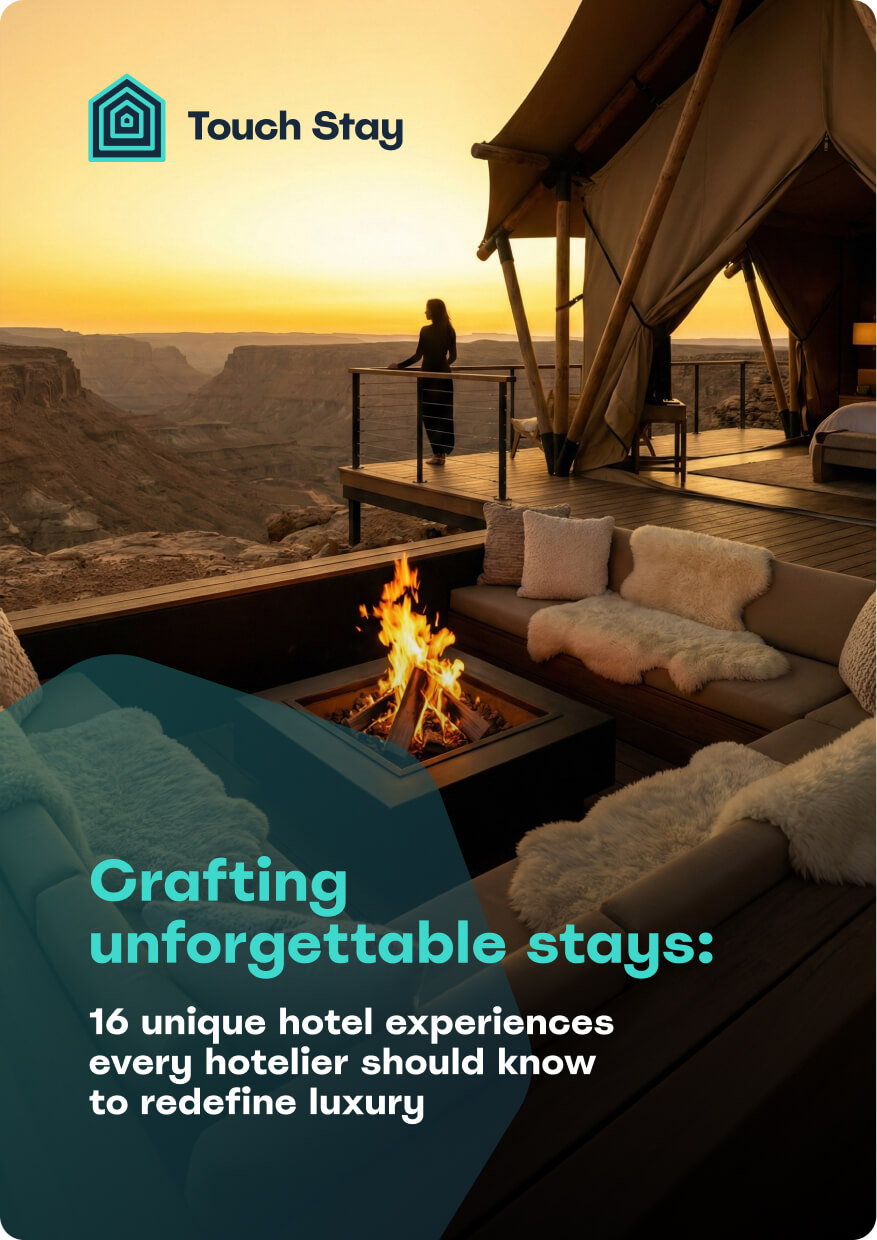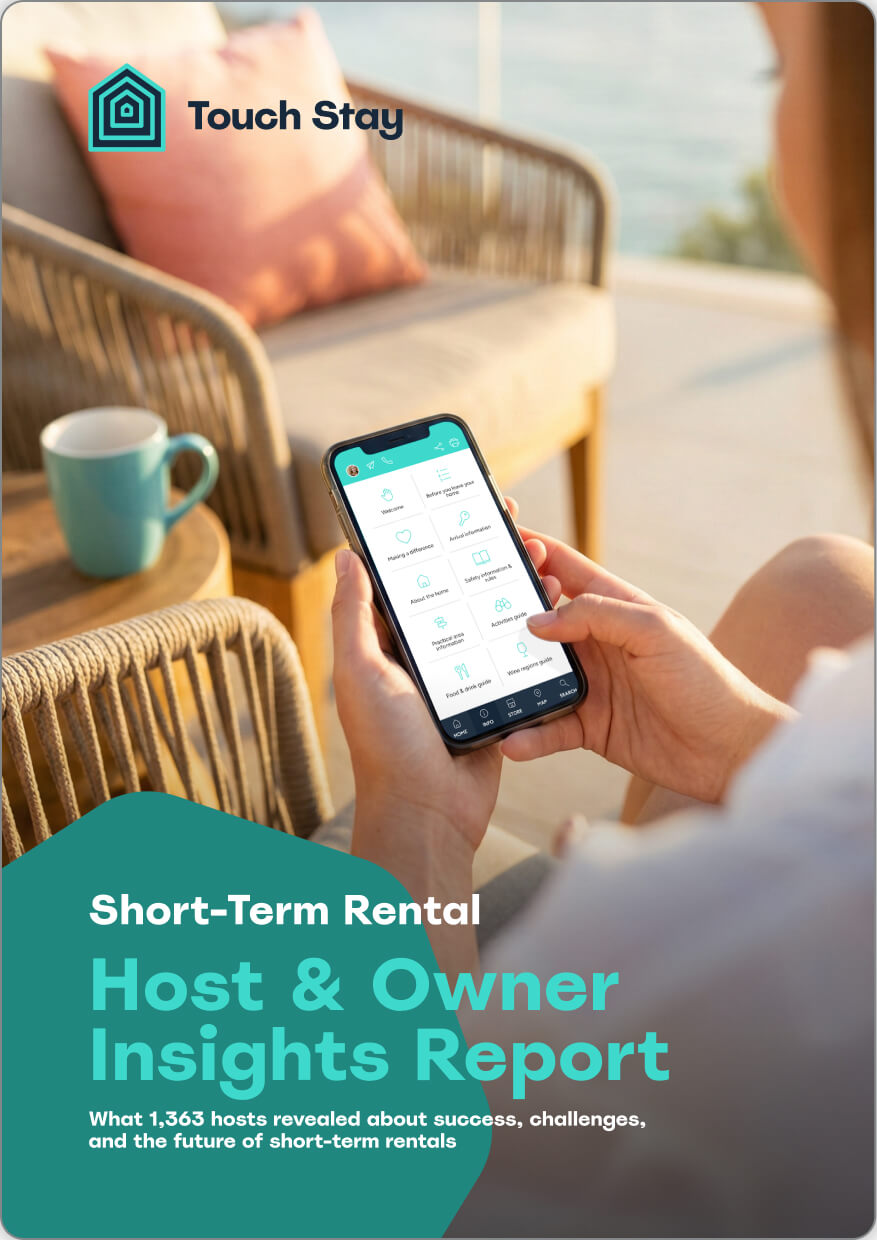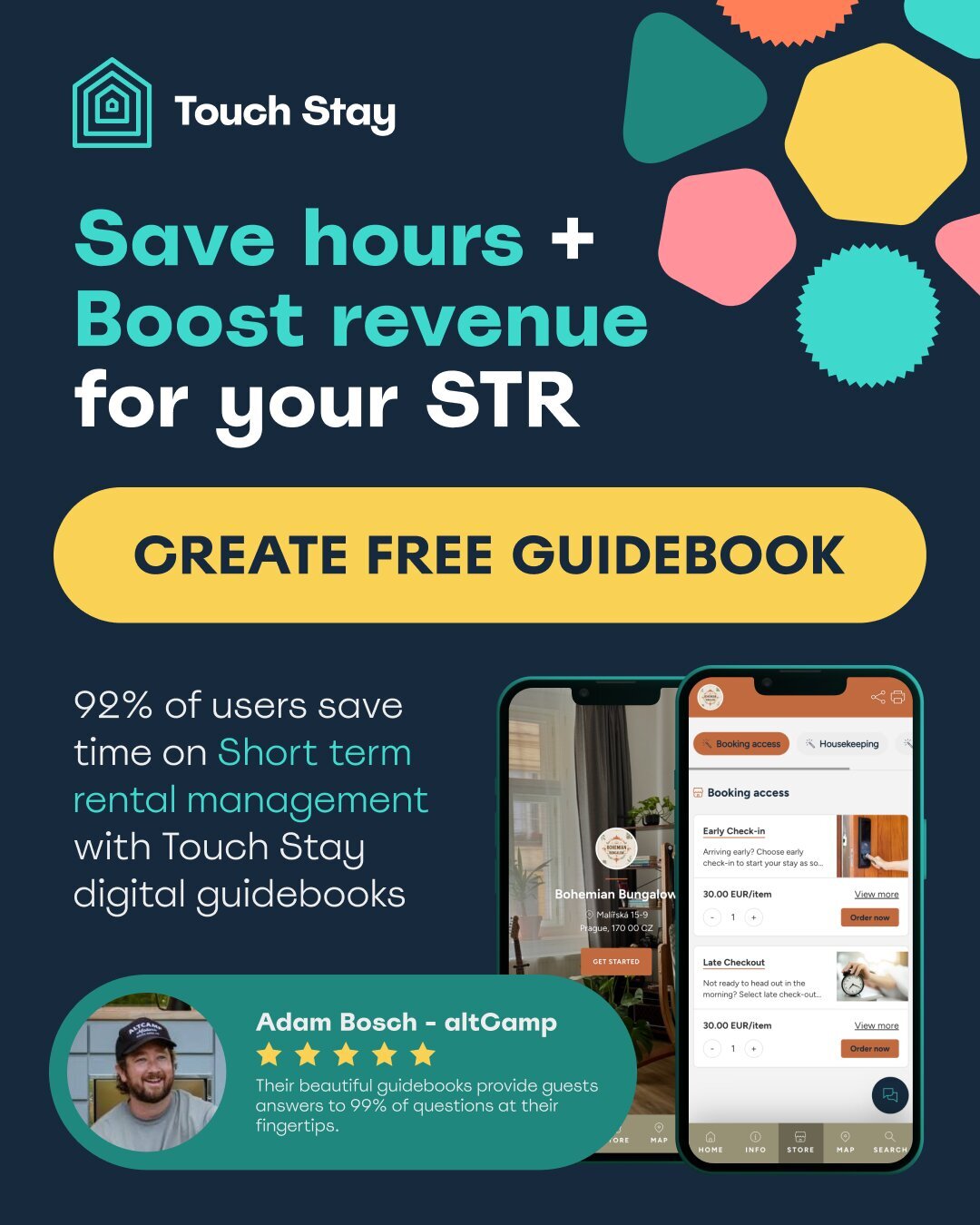Our recent Guest Communication Study provides a detailed analysis of current trends and best practices, offering actionable insights for hoteliers and property managers to enhance their guest interactions.
This comprehensive guide serves as a roadmap to improve communication strategies and transform the guest experience, covering the following topics:
- Overview of the Guest Communication Study
- Key trends in guest communication
- Best practices for property managers
- Challenges and solutions
- Future of guest communication
Overview of the Guest Communication Study
We surveyed 2,024 vacation rental guests about the communication they received from their hosts before, during and after their trip.
Download the Touch Stay Guest Communication Study for FREE!
Research methodology
The Touch Stay Guest Communication Study employed a rigorous methodology to gather and analyse data on guest communication practices across the vacation rental industry.
This approach provided a comprehensive view of guest preferences, expectations, and experiences regarding communication throughout their stay, offering invaluable insights for property managers and hosts.
Key findings
The study revealed several critical insights that are shaping the future of guest communication:
- Two-thirds of guests receive 1-2, or no communications from their host.
- 69% of guests said communication influenced their likelihood to leave a positive review.
- More than a fifth of guests were missing information they needed.
- 44% of guests prefer mid-stay communication via text.
- 67% of guests want self check-in.
- Less than half of guests felt "very well looked after".
These findings underscore the transformative power of strategic guest communication in enhancing the overall guest experience.
Key trends in guest communication
Digital transformation
The hospitality industry is witnessing a significant shift towards digital communication tools. The study shows that nearly half (49%) of guests received emails from their hosts, while a similar number (48%) received messages via OTA apps like Airbnb, Booking, or Vrbo. This transition from traditional methods to digital channels has revolutionised the way vacation rentals engage with their guests.
Digital tools such as emails, OTA apps, and online guides allow for instant, seamless communication. They provide guests with the convenience of accessing information and services at their fingertips, anytime and anywhere. For property managers, these tools offer the advantage of automating routine communications, freeing up staff to focus on more personalised guest interactions.
Personalisation of guest experiences
One of the most striking trends revealed by the study is the impact of personalised communication on guest satisfaction. Properties that tailor their communication to individual guest preferences and needs see a remarkable increase in guest satisfaction scores.
Personalization goes beyond simply addressing guests by name. It involves using data intelligently to anticipate guest needs and preferences. For example:
- 40% of guests hail recommendations from their host as contributing to a positive vacation experience.
- 38% place importance on booking with someone who knows and loves the property/area.
By leveraging guest data effectively, vacation rentals can create a more intimate, tailored experience that resonates with each individual guest.
Impact on guest satisfaction
The study clearly demonstrates the direct link between effective communication strategies and guest satisfaction. Properties that have implemented comprehensive communication plans report not only higher guest satisfaction scores but also see improvements in other key performance indicators:
- 66% of guests felt very well looked after when contacted 3-5 times during their stay.
- 69% of guests cite communication-related aspects as the most likely influence on their inclination to leave a positive review.
- Guests contacted 3-5 times are more likely to discover new things to see and do, and to purchase add-ons or extra nights.
These statistics highlight the far-reaching impact of guest communication on a property's overall success.
Best practices for property managers
Strategic communication planning
To harness the full potential of guest communication, property managers must develop a comprehensive strategy. Here are key steps to consider:
- Audit current communication touchpoints: evaluate all existing guest communication channels and identify gaps or areas for improvement.
- Define communication objectives: clearly outline what you aim to achieve through your guest communication efforts.
- Map the guest journey: identify critical points in the guest journey where communication can add value, from pre-booking to post-stay follow-up.
- Create a content calendar: plan your communication content in advance, ensuring a consistent flow of relevant information to guests throughout their journey.
- Implement feedback mechanisms: regularly collect and analyse guest feedback to continually refine your communication strategy.
Leveraging technology
The study highlights the importance of utilising the right technology to streamline guest communication processes. Here are some recommended tools and platforms:
- Email systems: with 53% of guests preferring email for pre-stay communication, invest in a robust email marketing system.
- SMS/Text messaging: 44% of guests prefer text for mid-stay communication, so implement an SMS system for quick updates and check-ins.
- OTA apps: utilise the messaging features within OTA platforms, as 29% of guests prefer this method for pre-stay communication.
- Online guides or apps: 10% of guests received information via an app or online guide, which can serve as a comprehensive resource for guest information.
Training and development
While technology plays a crucial role, the human element in guest communication remains irreplaceable. The study emphasises the importance of ongoing training and development for all staff. Key areas to focus on include:
- Communication skills: train staff in both written and verbal communication, emphasising clarity, empathy, and problem-solving.
- Local knowledge: equip staff with in-depth knowledge about the property and local area, as 38% of guests value this in their hosts.
- Technology proficiency: ensure all staff members are comfortable using the property's communication tools and platforms.
- Personalisation techniques: train staff on how to tailor communications to individual guest needs and preferences.
Challenges and solutions
Barriers to effective communication
The study identified several common challenges that vacation rentals face in their guest communication efforts:
- Information overload: more than a fifth (21%) of guests didn't have all the information they needed, suggesting a balance is needed in communication quantity and quality.
- Timing of communications: guests have varying preferences for when they receive different types of information, making it challenging to create a one-size-fits-all approach.
- Format preferences: guest preferences for communication formats (email, text, phone, etc.) vary by age group and stage of the stay.
- Lack of personalisation: only 30% of guests felt they received all the information they needed and more, indicating a gap in tailored communication.
Practical Solutions
Leading vacation rentals are addressing these challenges through innovative solutions:
- Staged information delivery: break down information into digestible chunks and deliver it at relevant points in the guest journey to prevent overload.
- Multi-channel communication: use a mix of communication channels (email, text, OTA apps) to cater to different guest preferences.
- Age-targeted communication: tailor your communication methods based on guest demographics, e.g., using OTA apps more for younger guests and email for older guests.
- Personalised recommendations: leverage local knowledge to provide tailored suggestions for activities and restaurants, as 40% of guests value this.
- Self-check-in options: implement self-check-in processes, as 67% of guests prefer this option for ease and enjoyment of their stay.
Future of guest communication
Upcoming technologies
The vacation rental industry is on the cusp of a communication revolution, with several emerging technologies poised to transform guest interactions:
- AI-powered chatbots: these could provide instant, 24/7 responses to guest inquiries, improving response times and guest satisfaction.
- Virtual concierge services: AI-driven concierge services could offer personalised recommendations and bookings for local attractions and restaurants.
- Augmented reality (AR) property guides: AR could offer interactive property tours or local area guides, enhancing the guest's understanding and experience of their surroundings.
- Voice-activated assistants: AI-powered voice assistants in rental properties could provide a more natural and intuitive way for guests to access information and services.
Predicting guest needs
The future of guest communication lies in anticipating and fulfilling guest needs before they even arise. Advanced AI and machine learning algorithms will play a crucial role in this predictive approach:
- Behavioural analysis: AI systems will analyse past guest behaviour to predict preferences and potential issues during future stays.
- Contextual awareness: communication systems will consider factors like weather, local events, and travel disruptions to provide relevant, timely information to guests.
- Personalised upselling: AI-driven systems could offer tailored add-ons and extra nights based on individual guest preferences and behaviour patterns.
- Automated review prompts: systems could generate personalised prompts to encourage guests to leave detailed, positive reviews based on their specific experiences.
By embracing these future technologies, hotels and vacation rentals can stay ahead of the curve in guest communication, offering increasingly personalised and seamless experiences.
Conclusion
The Touch Stay Guest Communication Study highlights the crucial role of digital transformation, personalisation, and strategic communication in enhancing the guest experience in the hospitality industry. By leveraging technology, investing in staff training, and addressing common challenges, property managers can boost guest satisfaction, increase repeat bookings, and enhance their reputation.
While emerging technologies offer innovative ways to connect with guests, the fundamentals of clear, timely, and personalised communication remain essential. For hotel managers and property owners, prioritizing and continually improving your guest communication strategy is vital for success in today's competitive landscape. Embracing the study's insights can transform your approach and elevate your property to new heights of guest satisfaction and business success.
Take action today: evaluate your current communication practices, identify areas for improvement, and implement these strategies. Your guests and your bottom line will thank you.
Try Touch Stay free for 14 days to start nailing your guest communication today!

Ned
Ned has clocked up over 11 years in digital marketing and comms, with a strong focus on creating engaging content for a range of brands and agencies. When he’s not writing, he can be found digging for records, peering through his telescope at the night sky, or onboard his local lifeboat where he volunteers as a crewmember.
Be the first to know!
Join our newsletter for early access to:
- ✅ Free guides
- ✅ Pro tips & tricks
- ✅ Time saving tutorials
- ✅ Latest blog posts
- ✅ Checklists & templates









.png?width=50)











.webp?width=50)
.webp?width=50)